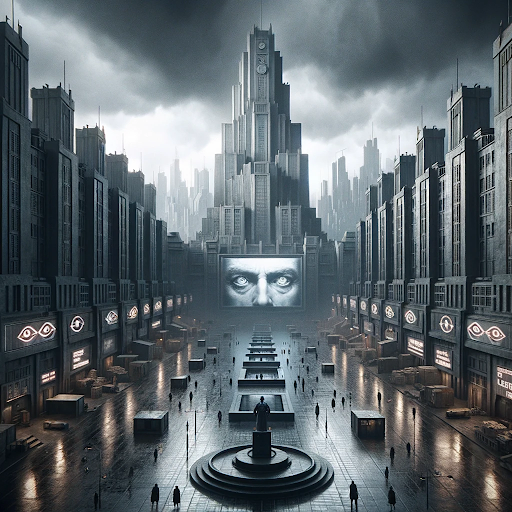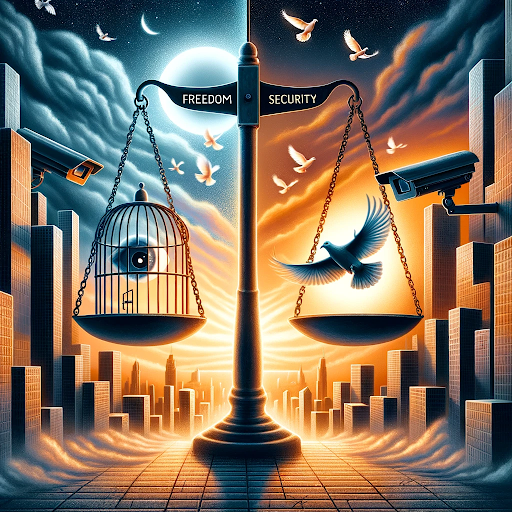Review of “1984” by George Orwell
Updated: 6 November 23
61
A Prophetic Novel on Surveillance and Freedom
In a world teetering on the delicate balance between surveillance and freedom, 1984 by George Orwell emerges as a chilling prophecy rather than mere fiction. This novel, a cornerstone of dystopian literature, is crucial for anyone interested in the ramifications of authoritarian rule and the price of security over liberty. Orwell, a master of political storytelling, crafts a narrative that transcends time and continues to resonate with readers across generations.

Author’s Background
George Orwell, born Eric Arthur Blair, was an English novelist, essayist, journalist, and critic. His work is marked by lucid prose, awareness of social injustice, opposition to totalitarianism, and outspoken support of democratic socialism. Orwell’s experiences in the Spanish Civil War and the mid-century political climate heavily influenced his writing. “1984” and “Animal Farm” remain his most acclaimed works, often cited for their insights into the mechanisms of Soviet totalitarianism.
Main Content of the Review
Summary
“1984” by George Orwell unfolds in a grim future where Great Britain, now Airstrip One in Oceania, is under the thumb of The Party, led by Big Brother. The novel’s protagonist, Winston Smith, navigates this oppressive world while working at the Ministry of Truth, where his job is to alter historical records. But as Winston becomes involved in forbidden love and thoughtcrime, he discovers the cost of intellectual and emotional freedom.
Critical Analysis
Orwell’s “1984” excels in its haunting portrayal of a totalitarian society. The novel’s strengths lie in its prescient vision of surveillance technology and government overreach, which echoes in today’s digital age. However, some critics argue that the characters are more symbolic than fleshed out, serving the purpose of the narrative over character development. Compared to other dystopian works like Aldous Huxley’s “Brave New World,” Orwell’s vision is starkly austere, focusing on control rather than pleasure as a means of oppression.

Personal Reflection
As someone deeply intrigued by the interplay between privacy and power, “1984” struck a nerve. It’s astonishing how Orwell’s imagination paved the way for discussions on modern-day data privacy and surveillance. His depiction of the Thought Police and Newspeak provides a cautionary tale that feels increasingly relevant.
Recommendation
This novel is recommended for readers interested in political theory, dystopian futures, and the social impact of technology. It’s particularly pertinent for those who question the role of government and the boundaries of personal freedom.
Conclusion of 1984 by George Orwell
1984" by George Orwell
In a world teetering on the delicate balance between surveillance and freedom, "1984" by George Orwell emerges as a chilling prophecy rather than mere fictio…
Who is Big Brother, and what does he represent in the book?
Big Brother is the face and the symbolic figurehead of the Party, the authoritarian regime controlling the society in “1984.” He represents the Party’s power and omnipresence. Every citizen is made to believe that Big Brother is watching them at all times, which is a metaphor for constant surveillance and the government’s control over its people.
What is “Newspeak,” and why is it important in “1984”?
Newspeak is the official language of Oceania and is designed to meet the ideological needs of the Party. It is characterized by a diminishing vocabulary; words that might carry political or rebellious meanings are removed or replaced. This controlled language plays an important role in Orwell’s narrative, demonstrating how restricting language can serve to limit freedom of thought and concepts that challenge the Party’s authority.
Can “1984” be considered a prophecy or prediction of the future?
While “1984” is often seen as a prophetic work, it is better described as a warning rather than a prediction. Orwell wrote it as a cautionary tale to highlight the potential consequences if the tendencies of his time, such as extreme political ideologies and oppressive regimes, were allowed to proliferate unchecked. It is a reflection on the potential for abuse of power and the erosion of individual freedoms.
Why is the book titled “1984”?
Orwell titled the book “1984” as it was written in 1948, and the inversion of the last two digits was meant to indicate a not-so-distant future. Orwell sought to draw attention to the current issues of his time by projecting them into the future. The title underscores the idea that the dystopian reality he describes could emerge if the trends of his era continued to develop.
“1984” by George Orwell remains a paramount work that not only defines its genre but also provides a vital commentary on our society. Its relevance continues to stir discussions around governance, privacy, and human rights. Join the discourse—read, reflect, and understand why Orwell’s world must remain fiction.
About Us
“Step into our world of literary wonders! Embark on a journey through our extensive collection of immersive book reviews and in-depth explorations. Join a vibrant community of book enthusiasts as we uncover hidden gems, unravel the magic of storytelling, and discover your next favorite read. Let’s celebrate the joy of reading together!”


Please Write Your Comments